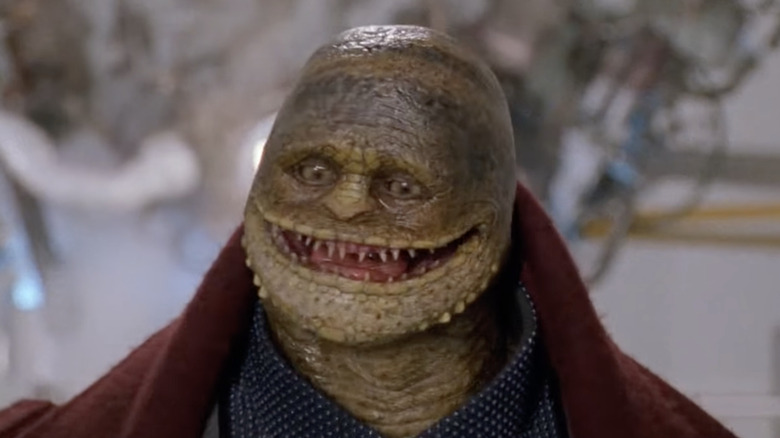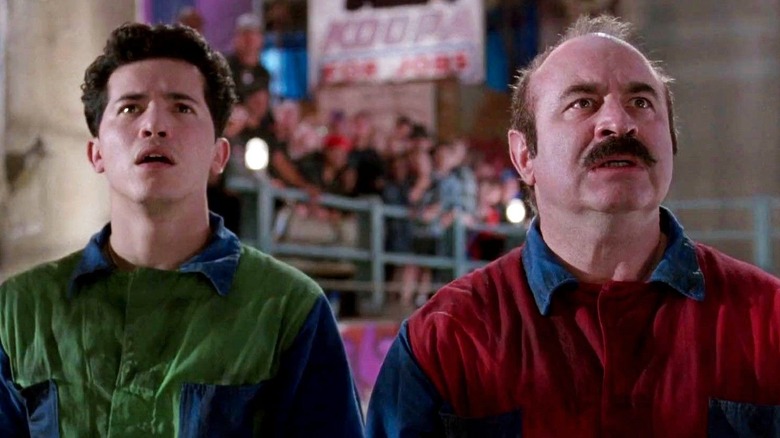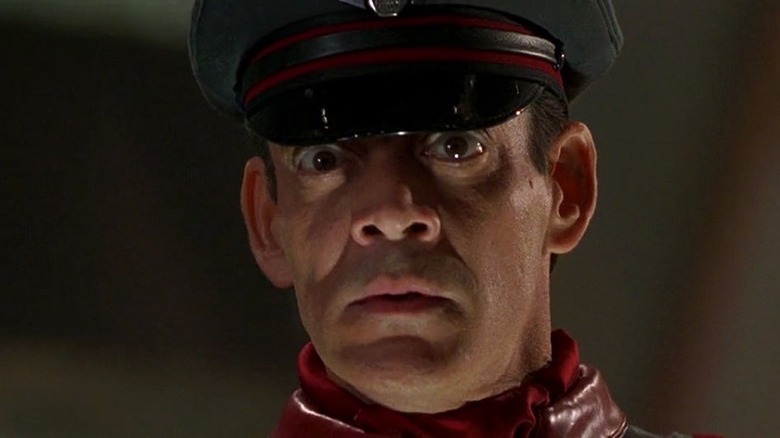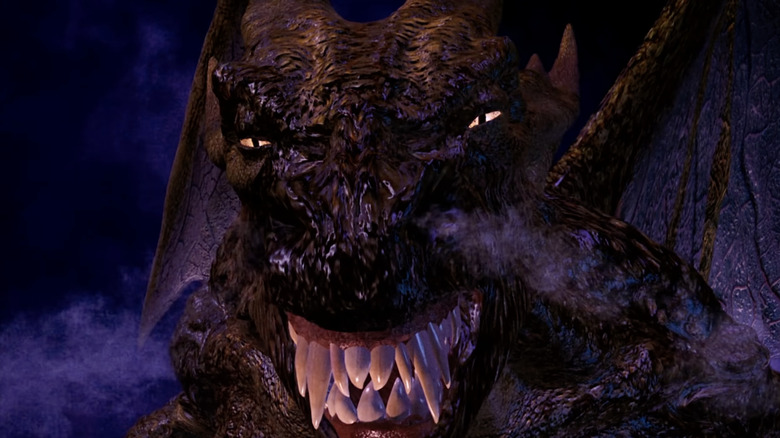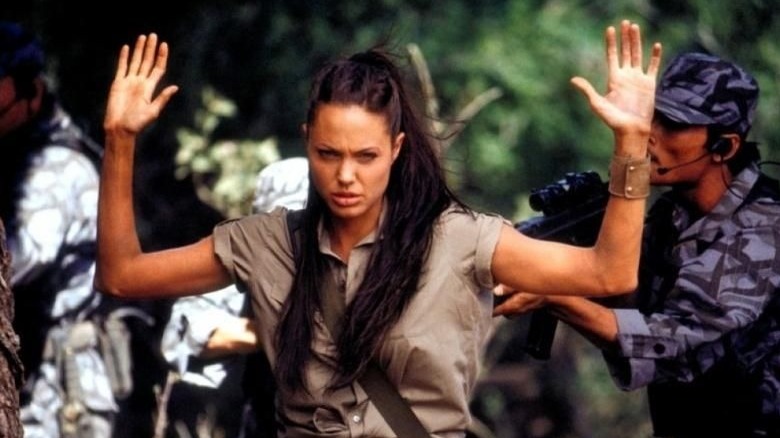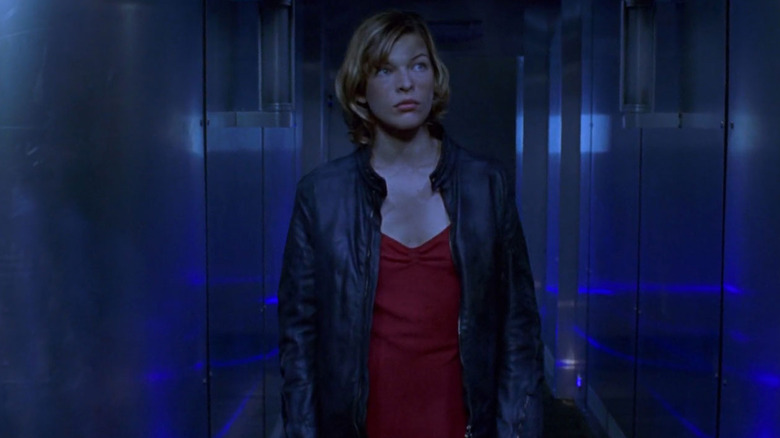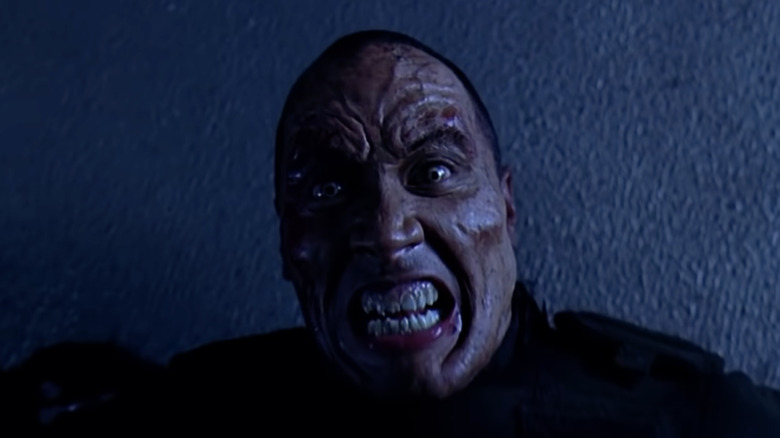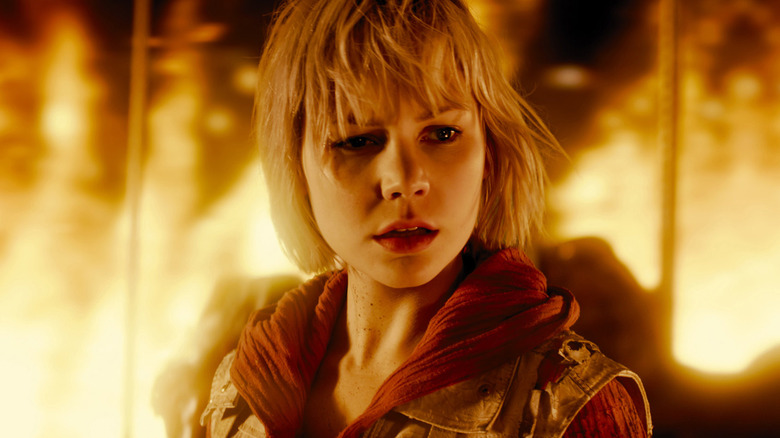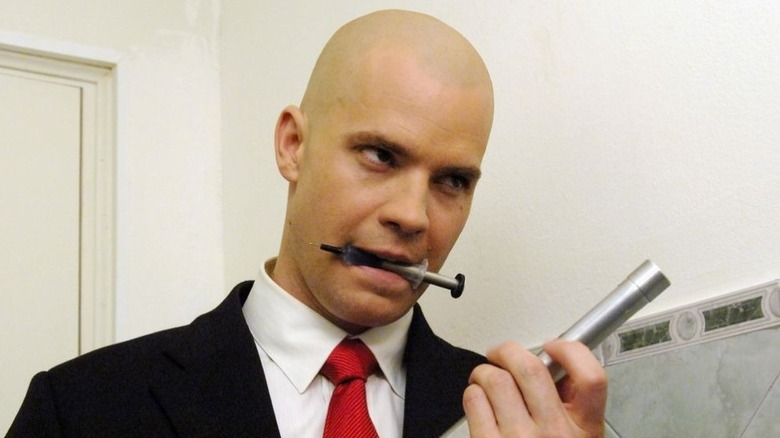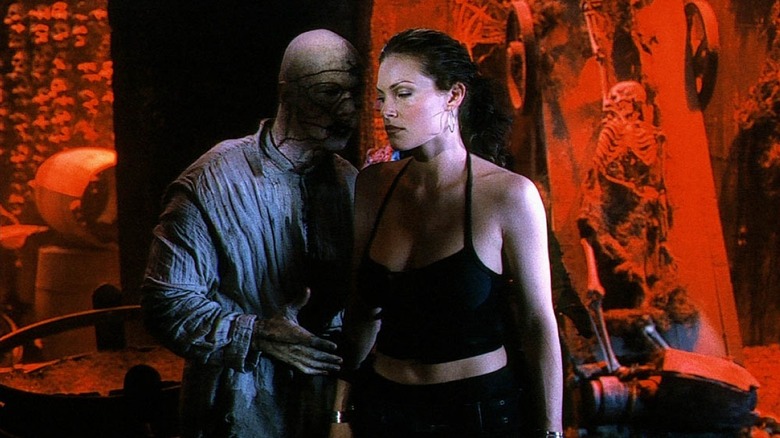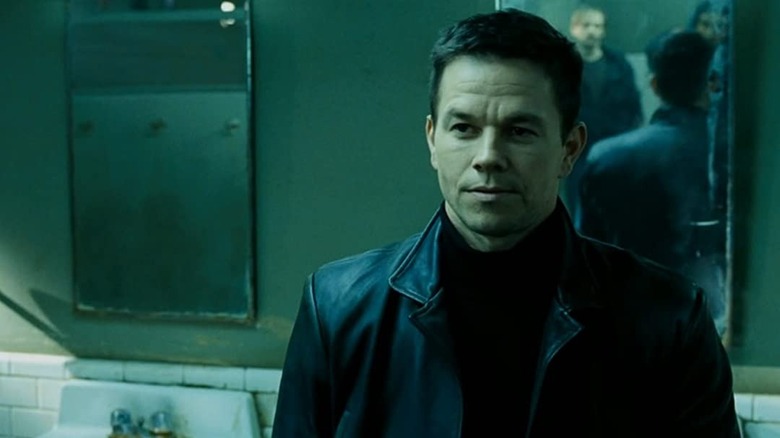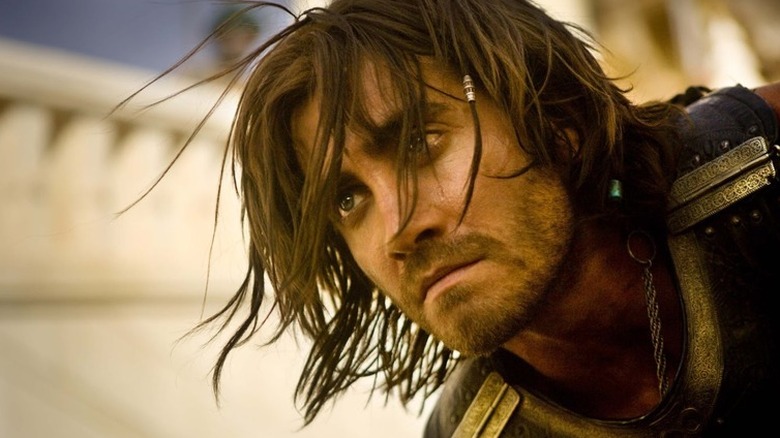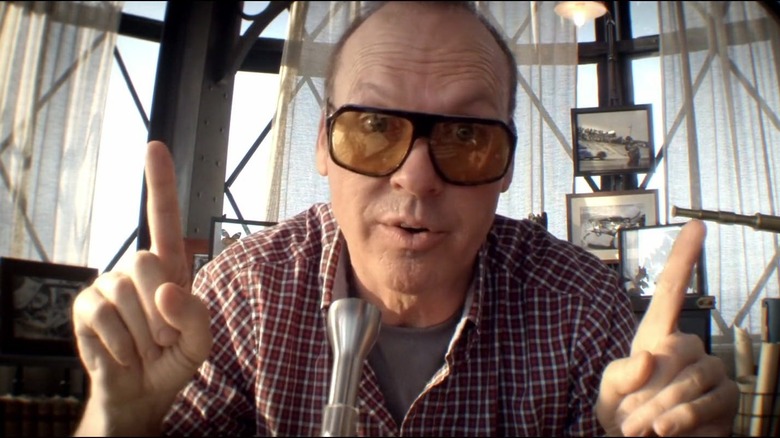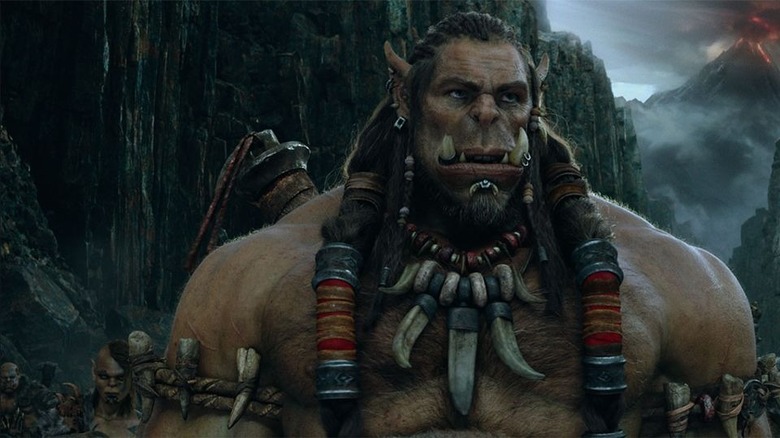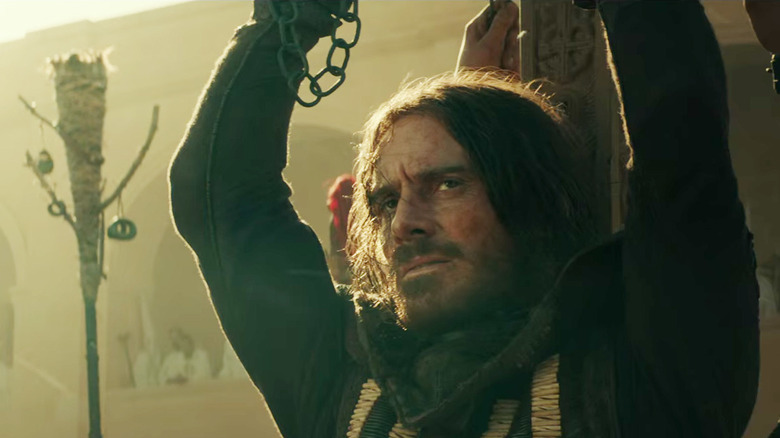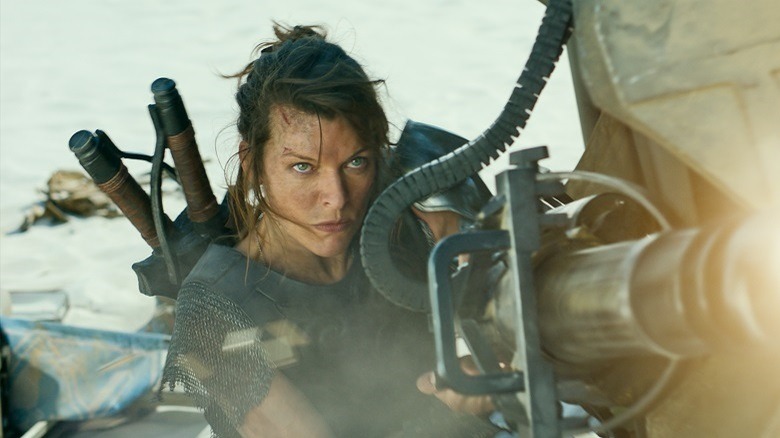The Tragic History Of Video Game Movies Explained
Very few movie genres consistently fail as much as video game-based films. History dictates that video game properties are just not suited for Hollywood adaptations. That's not to say the topic of video games are taboo. "Tron," "Wreck-It Ralph," and "Free Guy" are just a few successful films that have been inspired by video game culture. It seems that the real issue lies in Hollywood's repeated attempts to adapt video games directly.
There are many underlying factors that cause these types of cinematic disasters, including tone deaf executives, dull storylines, and bizarre design choices, just to name a few. And unfortunately for hardcore fans, it seems as though nothing has been learned from previous terrible experiences. either. In fact, over the long history of video game film adaptations, many of the same mistakes keep being repeated, time after time.
From some of the most important games in history to more niche franchises, a number of beloved video games have fallen victim to the movie curse. Here's a look back at some of the worst.
Super Mario Bros.
The first Hollywood game adaptation, "Super Mario Bros.," set the stage for every bad video game movie to come. The poor representation of the "Mario" world. Bob Hoskins and John Leguizamo are believable as the titular protagonists, but they are the only things somewhat resembling the games. Goombas look more like dragon men, Yoshi is a generic dinosaur, and Dennis Hopper as a humanoid King Koopa is baffling.
Hopper later told AV Club that he only accepted the role for the money. In regards to the film's inconsistent husband-wife directing duo and his 17 weeks on the over-budget project, Hopper summed things up by saying, "It was a nightmare."
Hopper isn't the only cast member with regrets, however, as Bob Hoskins also made his hatred for the film abundantly clear. When sitting down with the Guardian, Hoskins also criticized the directors and said it was his "worst job" ever.
"Super Mario Bros." came out at a time when the Italian plumber was at peak popularity. The 1993 film was received poorly by critics and fans alike and didn't do well at the box office. It's truly a miracle that the movie didn't tank Mario's reputation altogether. Maybe 2022's "Super Mario Bros.: The Movie" will fare better.
Street Fighter
"Super Mario Bros." failed to accurately represent the source material. A year later, "Street Fighter" was in the position to right the wrongs of Mario's cinema debut.
Unfortunately, writer/director Steven De Souza had the idea of veering off the iconic tournament premise of the series. Opting for a more James Bond-style adventure, De Souza went to Capcom with his film. In an interview with The Guardian, De Souza stated that he quickly learned that Capcom had a similar vision.
Unfortunately, this would basically be the only agreement between the two parties, and creative differences gradually emerged. De Souza believed a core cast of seven was sufficient, but Capcom kept adjusting the number of game characters after every draft was turned in. The strong disconnect between the filmmaker and the game's creators was already a problem, but sick actors and dangerous stunts would plague the filming process.
As noted by Polygon, "Street Fighter" would go on to become a box office failure and critical disaster, but it has gained a bit of a resurgence through a cult following, however. Later adaptations of the influential franchise have not exactly fared better. At this point, "Street Fighter 2: The Animated Movie" might be the closest fans will get to a faithful adaptation, with Kotaku considering it to be "one of the best game movies of all time."
Mortal Kombat: Annihilation
The original "Mortal Kombat" movie managed to provide a serviceable movie experience for lovers of the franchise. "Mortal Kombat: Annihilation" had a clear pathway to exceed expectations and improve on its predecessor, but it was a miserable failure.
It's almost never a good sign when actors are recast for a direct sequel, and the replacement of Raiden and immediate death of Johnny Cage disappointed fans. Newcomers are even worse, with characters like Musetta Vander's Sindel saddled with some of the worst lines in movie history.
But the special effects are arguably worse. The abundant use of green screen makes just about every fight scene look like a fan made project. The most egregious part comes when Liu Kang and Shao Kahn both morph into goofy, unfinished-looking CGI dragons.
Director John R. Leonetti has actually corroborated fans' assumptions concerning the rushed effects, explaining to Flickering Myth that they "are not the final effects" the production intended. The studio's accelerated production schedule led Leonetti to believe that New Line Cinema ultimately prioritized business over quality.
"Mortal Kombat: Annihilation" made a number of horrible missteps during production. A poor script, altered cast, and unfinished special effects culminated in a film that jeopardized the video game movie genre even further.
The Tomb Raider series
Fittingly, "Lara Croft: Tomb Raider" begins with the protagonist exploring an ancient tomb. She then combats a large robot and performs moves reminiscent of the game, only to reveal that this encounter is just a training exercise taking place in her manor. This is all in the first 5 minutes of the film, by the way.
"Lara Croft: Tomb Raider" and it's sequel, "Cradle of Life," are movies that go way over the top. This can be a benefit, however, as some critics gravitated more to the zaniness. Roger Ebert wrote that the film is "so monumentally silly, yet so wondrous to look at." Sadly, that's where the praise ended, as he then went on to criticize its less-than-stellar plot. Many of Ebert's critiques of the film held true when he reviewed the sequel.
Regardless of the goofy plots, consistent acclaim has been aimed towards Angelina Jolie's portrayal of Lara Croft, with Rotten Tomatoes declaring that she "redefined the character." Shockingly, Jolie had initially turned down the role, telling Collider that she didn't feel as though the character was suited to her. It's a good thing she changed her mind, since she arguably elevated both films. Her role in the first two films are so iconic that it left outlets like Forbes disappointed in 2018's Alicia Vikander-starring reboot.
The early film adaptations of "Tomb Raider" got the casting right, but the lack of a memorable story hampered their legacy. Maybe the sequel to 2018's "Tomb Raider" will finally get the formula right.
The Resident Evil Series
Where to start with Paul W.S. Anderson's "Resident Evil" movies? Although the director saw moderate success with "Mortal Kombat," Anderson's Capcom-based films never stuck the landing. All six of the Anderson-produced films starred his wife, actress and model Milla Jovovich, as Alice. An original character created for the films, Alice ended up overshadowing legacy characters of the franchise. As a result, "Resident Evil" movies get so much wrong about the games, including character motivations and plot details.
Unfortunately, the visuals don't quite make up for the inaccuracies. The fourth movie in the series, "Resident Evil: Afterlife," is particularly full of outrageous effects, which YouTube channel RedLetterMedia reacted to in a hilarious teardown video.
Discussing his career with AV Club, Anderson professed that he enjoys the movies he makes, explaining that they are the kind of movies he grew up watching. Despite some dreadful critical reactions, Anderson has stood his ground when it comes to his action films.
And maybe he should, because the "Resident Evil" films have grossed $1.2 billion against their accumulative $288 million budget. Anderson has proven that there is a market for video game adaptations, regardless of an onslaught of negative reviews. And even though Paul W.S. Anderson is finished with the "Resident Evil franchise," Capcom is still persistent in reviving the property for the big screen, starting with "Resident Evil: Welcome to Raccoon City."
Doom
Many video game adaptations have been released to ride the source material's popularity, but "Doom" was an odd exception to the trend. "Doom" took so long to make that it was debuted nearly 12 years after the original game came out.
It's no secret that a number of A-list actors have regretted their game-based roles, and Dwayne Johnson has been extremely outspoken about his film. After early reviews of "Rampage" were released, Johnson took to Twitter to throw jabs at "Doom," which he claimed was a victim of the "video game curse."
His sentiments were substantiated by meager box office returns and poor fan reactions: The 2005 movie brought in $58.7 million on a $60-70 million budget and currently has an 18% Rotten Tomatoes score.
Countering Johnson's feelings was John Carmack, the founder of "Doom" developer id Software. When Kikizo asked Carmack what he thought of the film, the lead programmer responded by saying that he liked it and thought it had "fun nods to the gaming community."
The most famous nod was a nearly 5-minute scene depicting an FPS-like perspective, which screenwriter Wesley Strick insisted on keeping. While Strick has been open about the film's flaws, he told Den of Geek that this scene was "delightful" from a visual standpoint. The moment is widely regarded as the best part of the film (per Polygon) and one of the best scenes of any video game adaptation.
The Silent Hill series
The "Silent Hill" franchise has had a rocky history, and that extends to the film adaptations. While the first film, released in 2006 was negatively received, it slowly accrued a cult following and defenders (per Bloody Disgusting). The same can't be said of its 2012 sequel, "Silent Hill: Revelation."
"Silent Hill" follows Rose (Radha Mitchell) and her daughter Sharon (Jodelle Ferland). The two end up in the town of Silent Hill, where they come across a religious cult and other eerie figures. Outlets like Flixist have asserted that director Christopher Gans' picture is underrated, giving props to the movie's focus on female characters and interesting camera angles. Also of note is the gothic score, which was written by Akira Yamaoka, the veteran composer for the game franchise.
M.J. Bassett's "Revelation" could not deliver, however, and did a disservice to the original movie and the source material. Movie critic Jeremy Jahns singled out the biggest elephant in the room: the acting. Even though "Silent Hill: Revelation" managed to snag the likes of Sean Bean and Kit Harrington, their performances left a lot to be desired. Jahns suggested that some actors seemed as though they didn't want to be there. Other reviews have singled out the film's awful special effects and forgettable plot.
Luckily for fans, original film director Christopher Gans is set to make a new movie that hopefully revitalizes the film series (per PC Gamer).
The Hitman Series
"Hitman" is just one of those gaming properties that may never work in film. Everything about the gameplay seems to contradict what sells movie tickets. Both "Hitman" and "Hitman: Agent 47" are exemplary in their ability to get the tone, character, and premise so wrong.
For starters, "Hitman: Agent 47" is exposition heavy. Critics like Angry Joe and Chris Stuckmann critiqued the amount of story explanation that occurs, primarily in the first half. The "Hitman" games are the opposite, often opting for a quick intro or debriefing to get 47 closer to his objective.
The actual gameplay from the "Hitman" series isn't emulated well at all either. Both films pride themselves on selling general action and large set pieces. Roger Ebert's review pointed to a scene in the first "Hitman" in which the protagonist runs down a corridor with guns blazing. Ebert wrongly assumed that those kinds of scenes were undoubtedly from the game, when in fact, these types of action and stunt-oriented moments couldn't be farther off from the source material.
The "Hitman" games are all about the slow and methodical kill, encouraging absolute stealth and leaving shooting as a last resort. Tailing a target to determine their patterns while assessing the area for quick getaways is fundamental to the "Hitman" experience. Hardcore fans of the franchise have argued that a premise like this is integral to the landmark stealth series, which is why a movie might never work. It probably doesn't help that both movies share the same screenwriter.
House of the Dead (and other Uwe Boll films)
"Far Cry," "Alone In the Dark," "Bloodrayne," "House of the Dead" — no video game IP is safe from Uwe Boll. The director is infamous for making some of the most hated video game movies of all time, leading "Metal Gear" creator Hideo Kojima to say "it's impossible that we'd ever do a movie with him" (per Engadget).
Boll's films are typically very loosely based on the source material. For instance, the original "House of the Dead" game follows agents investigating a biochemist's mansion and battling undead creatures, while the movie follows a group of friends trying to travel to an island for a rave and encountering zombies.
Criticism has been leveled towards Boll's directing style, stories, and characters. YouTuber I Hate Everything singled out the camera work in "House of the Dead," stating, "every single shot is so flat and boring." This low effort extends to his other adaptations, and some sources claim to know why.
Brock Wilbur, a journalist and author who is well-versed on Boll's career, told Kotaku that Boll came across a tax loophole in Germany that allows filmmakers to write off investing in new movies. This allegedly led Boll to purchasing the rights to smaller game franchises to turn a pretty penny. Whether he made these bad movies intentionally or not, Uwe Boll left quite the impact on the 21st century's film industry. In 2019, Boll announced his retirement from the movie business (per Eurogamer), so his motivations behind making these films may remain a mystery.
Max Payne
One of Remedy Entertainment's early works, "Max Payne" achieved iconic status for its graphic novel-style storytelling and bullet time mechanics. What better way to recreate this cinematic gunplay than through a movie adaptation?
"Max Payne" had one job: go all-in on the action. Unfortunately, the movie failed to do even that. Reviewers like the Nostalgia Critic have commented on this bizarre lack of spectacle, noting that most important events seem to occur off-screen in the first half of the film. "Max Payne" does have some slow motion, but none of the usage is to its favor. Odd decisions abound, like choosing to show "Max Payne" slowly falling backwards.
A positive is that some of the game's premise is kept intact. Remedy's original storyline of Max hunting down his family's killers is more or less the same, and his occasional visions also look interesting. However, according to Empire's review, the brooding tone often "borders on parody."
Remedy does have regrets with the adaption, as the company told Game Informer. Surprisingly, the movie rights were sold well before the actual release of the game. Remedy director Sam Lake acknowledged that the filmmakers took a close look at the game, and much of the source material's style was reflected in the final product. However, Lake felt that any future film adaptations would require Remedy to have "more creative involvement."
"Max Payne" represents a common outcome of game adaptations: It's a well-intentioned effort that simply didn't pay off.
Prince of Persia: The Sands of Time
"Prince of Persia: The Sands of Time" had a lot of potential. Disney distributed the film, "Harry Potter and the Goblet of Fire" director Mike Newell helmed it, and it featured an A-list cast. But even with all of these reassurances, "The Sands of Time" could not break the video game curse.
"The Sands of Time" revolves around the Dagger of Time, a time-manipulating artifact sought after by Persia and its enemies. Although this concept is a great hook for the movie and the game, the dagger isn't used very much. As noted in Jeremy Jahns' review, the dagger scenes are the best parts, so it's a shame that there are only a few of those instances.
"The Sands of Time" is another game that doesn't leave much room for a movie adaptation, since story is an afterthought when compared to the action and platforming elements. And similarly to the game, parkour is featured heavily in the film. In an otherwise harsh review, Collider praised the film's acrobatic scenes, stating that they were "fun to watch." Less fun to watch, however, are the character interactions. Jake Gyllenhaal and Gemma Arterton's characters have little chemistry, making it feel like the cast (which also featured Ben Kingsley and Alfred Molina) is ultimately wasted. Gyllenhaal would later admit to Yahoo! Entertainment that he felt he'd made a mistake in joining the film.
Need For Speed
This 2014 film, which the Hollywood Reporter called "flat," seemingly rips off the "Fast and Furious" formula while slapping on the "Need For Speed" brand. It could have been so much more, especially considering how the movie's story was developed. As writer and producer John Gatins explained to IGN, the screenplay for "Need For Speed" resulted from a partnership between himself and EA. A direct cooperation between filmmakers and game developers is a good sign, but this movie ended up wasting the talent attached to it.
Due to EA's involvement, "Need For Speed" isn't a huge departure from the games. Debt and revenge are abundant in the plot, along with some murder thrown into the mix. The main character, Tobey (Aaron Paul), must avenge his friend's death by pursuing their killer through an ongoing race. Like the games, the premise in "Need for Speed" exists just to add context to the high octane action.
Although the characters and their motivations are extremely forgettable, the vehicular chaos manages to compensate somewhat. As noted by MotorTrend's review, "Need For Speed" boasts some exciting car stunts and fun action, resulting in an "undeniably exciting experience" that doesn't have many realistic elements to hold onto.
Truth be told, "Need for Speed" was lacking a strong story to begin with; even though the movie nicely adapts the action of the games, the whole thing ends up feeling thin. Though sequels could tweak these issues, it's unclear if fans will ever get "Need For Speed 2."
Warcraft
Due to a surprisingly large box office return in China, "Warcraft" currently holds the title of highest grossing video game movie. Its record has little meaning since it does nothing to elevate the gaming genre.
Duncan Jones helmed the film, and his prior features "Moon" and "Source Code" suggested the resulting film would be something much more interesting than what fans got. Far from it. Many aspects of "World of Warcraft" didn't directly translate to film. For example, the intricate lore and story of "Warcraft" needed to appeal to newcomers and veteran players alike. Unfortunately, IGN's review pointed out that this was impossible with the film's runtime being just over 2 hours.
Variety elaborated on the mishandling of the project as well, arguing that Jones treated the source material too seriously, which "only underlines the silliness." The Verge's Tasha Robinson felt that the movie failed to find the right tone because it "is clearly trying to be richer and more sophisticated than the average fantasy blockbuster." The movie ultimately tried to juggle character moments with exposition-heavy lore and introductions of new worlds, and the sheer ambition led to a big mess instead.
However, China singlehandedly saved the movie from being a major flop. According to a report from BBC, many factors led to this unforeseen victory. The Chinese player-base being half of the 5 million concurrent players was coupled with the film occupying 67% of all of China's theaters, ultimately rescuing "Warcraft" from financial destruction.
Assassin's Creed
"Assassin's Creed" tried to get a lot of things right, but an original story connected to the games, an acclaimed cast, and a solid director somehow led to another flubbed video game adaptation.
Many filmmakers don't bother understanding the games that are influencing these projects, but "Assassin's Creed" took special care in preserving elements of the source material. Michael Fassbender's character, Cal, is put in the Animus, which allows him to live as his ancestor in 15th century France. As he uncovers his origins, Cal also encounters other Animus subjects, which leads to a number of connections to Ubisoft's games.
CBR pointed out a number of links to the franchise, including the presence of the protagonist of "Assassin's Creed Unity" in one scene. These easter eggs didn't appease diehard followers of the series, unfortunately. Many reviews have noted the film's lack of real character development and flawed explanations of mainstay concepts in the "Assassin's Creed" lore. Drawbacks such as these are coupled with bland scenes and uneven pacing to produce a picture that had wasted potential.
Probably most depressing of all are Michael Fassbender's remarks towards the experience. When Fassbender was asked how to make improvements for a possible sequel during an interview with Movie'n'co UK, he bluntly stated, "I would make it more entertaining." He went on to claim the movie ultimately took itself "too seriously."
Monster Hunter
Six underwhelming "Resident Evil" films were not enough for Capcom to cut ties with Paul W.S. Anderson. Somehow Anderson got the go-ahead to direct "Monster Hunter," which again starred Milla Jovovich.
"Monster Hunter" was kind of swept under the rug. Anderson's movie released at the tail end of 2020, when the COVID-19 pandemic was at full force. Beyond that, "Monster Hunter" opened to devastating criticisms and underwhelming box office results. In another world, the Capcom film could have been rescued by China like "Warcraft" was, but a spark of controversy actually caused "Monster Hunter" to be banned in China.
A joke in the film was seen as racist by Chinese viewers, which led to China pulling the film from all theaters shortly after release. The offending line was later removed from all global releases, but the damage had been done. As reported by Deadline, the cast and Anderson alike issued public apologies shortly after, with Anderson expressing remorse over "any anxiety or upset that this line and its interpretation caused."
"Monster Hunter" went on to completely flop financially, and is known as one of the biggest video game adaptation disasters in recent history. The attempt to launch a new franchise is even more of an embarrassment because it followed the resounding success of newer films such as "Pokemon: Detective Pikachu" and "Sonic the Hedgehog" (per Box Office Mojo). It's unlikely that fans will ever see "Monster Hunter 2" hitting the big screen.

